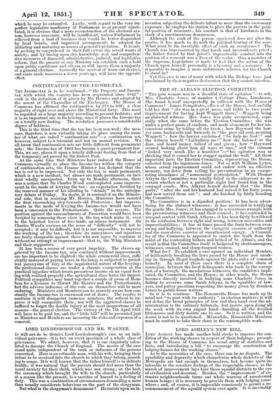LORD LONDESBOROUGH AND MR. WAGNER.
IT will not do to dismiss Lord Londesborough's case as an indi- vidual grievance—it is but an overt specimen of a whole class of grievances. We admit, however, that it is one singularly calcu- lated to damage the Church of England. The merits of the case stand quite independent of the rank or influence of the persons concerned. Here is an estimable man, with his wife, bringing their infant to be received into the church to which they belong, accord- ing to usage. It is well known that the father himself is in delicate health ; it was natural that the parents should feel more than the usual anxiety for their child, which was not strong ; at the best, the ceremony which brought the wife to the church, particularly at a season like the present, is a sacrifice of hazard to a feeling of duty. This was a combination of circumstances demanding a more than usually considerate behaviour on the part of the clergyman. But what ia the clergyman's demeanour P He insists upon an in-
novation subjecting the delicate infant to more than the customary exposure ; he employs his station to place the parents in the pain- ful position of recusants; his conduct is that of harshness in the cloak of a sanctimonious demureness.
Although the rank of the person aggrieved does not alter the merits, it has much to do with the political bearing of the case. What must be the inevitable effect of such an occurrence ? The Church was impersonated by that harsh and inconsiderate priest ; the father forced by that priest's impracticable conduct into the position of a recusant was a Peer of the realm : thus a member of the Supreme Legislature is made to feel that the action of the Church upon himself personally is a tyranny and a nuisance. Is it possible to imagine a more unfortunate relation for the Church to stand in ?
Yet this ease is one of many with which the Bishops have just proclaimed by their negative declaration that they cannot interfere.


























 Previous page
Previous page